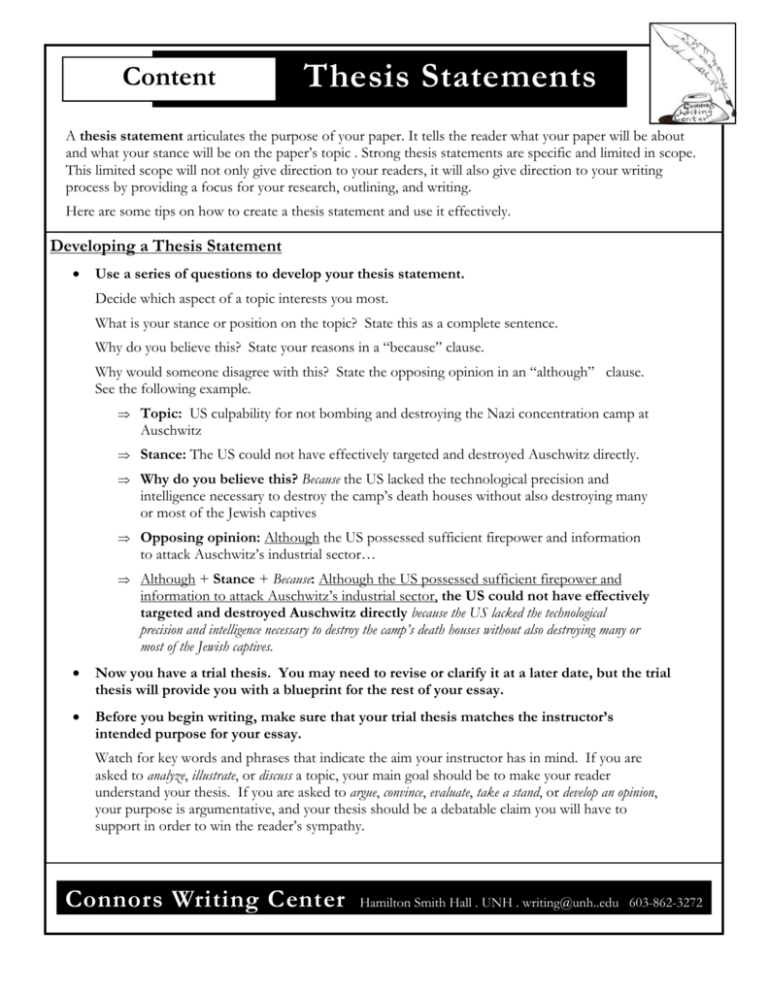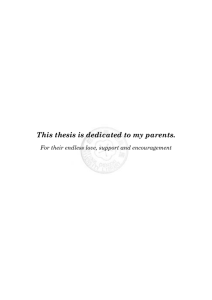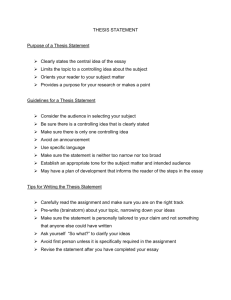
Content
Thesis Statements
A thesis statement articulates the purpose of your paper. It tells the reader what your paper will be about
and what your stance will be on the paper’s topic . Strong thesis statements are specific and limited in scope.
This limited scope will not only give direction to your readers, it will also give direction to your writing
process by providing a focus for your research, outlining, and writing.
Here are some tips on how to create a thesis statement and use it effectively.
Developing a Thesis Statement
•
Use a series of questions to develop your thesis statement.
Decide which aspect of a topic interests you most.
What is your stance or position on the topic? State this as a complete sentence.
Why do you believe this? State your reasons in a “because” clause.
Why would someone disagree with this? State the opposing opinion in an “although” clause.
See the following example.
⇒ Topic: US culpability for not bombing and destroying the Nazi concentration camp at
Auschwitz
⇒ Stance: The US could not have effectively targeted and destroyed Auschwitz directly.
⇒ Why do you believe this? Because the US lacked the technological precision and
intelligence necessary to destroy the camp’s death houses without also destroying many
or most of the Jewish captives
⇒ Opposing opinion: Although the US possessed sufficient firepower and information
to attack Auschwitz’s industrial sector…
⇒ Although + Stance + Because: Although the US possessed sufficient firepower and
information to attack Auschwitz’s industrial sector, the US could not have effectively
targeted and destroyed Auschwitz directly because the US lacked the technological
precision and intelligence necessary to destroy the camp’s death houses without also destroying many or
most of the Jewish captives.
•
Now you have a trial thesis. You may need to revise or clarify it at a later date, but the trial
thesis will provide you with a blueprint for the rest of your essay.
•
Before you begin writing, make sure that your trial thesis matches the instructor’s
intended purpose for your essay.
Watch for key words and phrases that indicate the aim your instructor has in mind. If you are
asked to analyze, illustrate, or discuss a topic, your main goal should be to make your reader
understand your thesis. If you are asked to argue, convince, evaluate, take a stand, or develop an opinion,
your purpose is argumentative, and your thesis should be a debatable claim you will have to
support in order to win the reader’s sympathy.
Connors Writing Center
7Hamilton Smith Hall . UNH . writing@unh..edu 603-862-3272
Writing with a Thesis Statement
•
Mark the passages in your research, freewriting, journal, or rough draft that support your position.
•
Create an outline for your essay using your thesis statement as a guide.
•
No matter what thesis statement you develop, you will need enough relevant information (research,
lab results, textual evidence, etc.) to support it credibly and clearly. As you write and revise, check
your thesis statement often to see if you have drifted away from it. It is important that each
paragraph relate closely to the thesis statement.
•
Usually, the thesis statement appears in the first or second paragraph of an essay. The advantage of
putting your thesis in the first paragraph is that readers know from the beginning what you are
writing about and where the essay is going.
Tips to Strengthen or Clarify your Thesis Statement
•
A well-developed thesis should...
be a complete sentence
summarize the point of view you will take in your paper
signal the main purpose of your essay
say something important about your topic
be specific enough for an essay of the assigned length
serve as a organizational blueprint for your essay
•
As you clarify your thesis statement, try to make it as specific as possible while still giving
yourself enough subject matter to work with.
TOO BROAD: In this essay I will discuss the effects of depression on first-year college students.
BETTER: When first-year college students are depressed by their inability to meet unfamiliar
academic and social demands, their depression makes it even harder for them to satisfy those demands.
TOO BROAD: Young people are too influenced by the media.
BETTER: The frequent use of unusually thin models in television and magazine advertisements
has contributed to the rise of eating disorders among adolescent girls and boys in the United
States.
•
Your thesis should make a definite point you can support with conviction.
Do not make an unassertive, weaseling thesis that makes a limp, indecisive statement. To make
sure you have a substantial idea, ask yourself whether your classmates would willingly read an essay
based on your thesis. Would it challenge them to think? Would your main point secure their interest? Would it tell them something new or give them a fresh perspective on a familiar topic? Be
especially wary of a sentence that states the obvious or merely announces a topic.
Connors Writing Center
7Hamilton Smith Hall . UNH . writing@unh..edu 603-862-3272
A thesis statement IS:
•
A thesis statement is limited so it can give direction to the paper.
The thesis statement sets limits on the scope of what you will cover in the paper, so it should
reflect the contents accurately.
UNLIMITED: Several factors extend human life.
LIMITED: Technological developments that prolong human life are not necessarily desirable for
all patients and their families.
•
A thesis statement is specific.
See the example regarding media on the previous page.
•
A thesis statement is an organizational aid.
If you stick to the thesis statement when you create your outline and write your paper, you will
keep yourself from straying from your main ideas. When you write the outline, check it against the
thesis statement and leave out anything that doesn’t directly relate to the thesis.
A thesis statement is NOT:
•
A thesis statement is NOT a promise or statement of purpose.
In the following example, the promise shows that you have expectations for your essay. The thesis
shows that you have fulfilled those expectations.
PROMISE: In this paper I am going to show that pro football salaries are not too high.
THESIS: Because the money that goes for pro football salaries puts money into the economy by
supporting many people and businesses, players’ high salaries are justified.
•
A thesis statement is NOT a topic or subject.
The topic or subject only tells what the paper is about, not what you have to say about the matter.
A thesis, however, will tell the reader what you have to say about the subject.
SUBJECT: The fitness craze in the United States
THESIS: The fitness craze in the US has resulted in a population more aware of the role of
exercise and good eating habits in lengthening people’s lives and in making them more productive.
Connors Writing Center
7Hamilton Smith Hall . UNH . writing@unh..edu 603-862-3272
A thesis statement is NOT (continued):
•
A thesis statement is NOT a question.
However, a question could help you to eventually find your thesis.
QUESTION: What will Maya Angelou’s place in literature be?
ANSWER: Maya Angelou will have a secure place in several genres of literature.
THESIS: Maya Angelou is an accessible writer whose prose, poetry, and film scripts will long be
read because they deal with human conditions, not just with the problems of African Americans.
In this example, the question paves the way for the creation of a working, arguable thesis
statement. The answer to the question provides a weak thesis statement. This statement is weak
because it is vague. A reader would want to know what is meant by a “secure place” and what the
“several genres” are. This statement would not help a writer organize information to include in
his/her paper; therefore, it is not a useful thesis statement. However, by modifying the weak thesis
to include specific wording, you are creating a thesis that will give your paper direction. It would
be easy to develop an outline from this thesis, which presents substantial information in a logical
order.
This handout was adapted from the following resources:
Crews, Frederick, Sandra Schor, and Michael Hennessy, eds. The Borzoi Handbook for Writers. 3rd ed. New York: McGraw-Hill, 1993.
Fulwiler, Toby and Alan R. Hayakawa. The Blair Handbook: Instructor Copy. Upper Saddle River, NJ: Pearson/Prentice Hall, 2007.
Glenn, Cheryl, Robert Keith Miller, Suzanne Strobeck Webb, and Loretta Gray, eds. The Writer’s Harbrace Handbook. 2nd ed. United States:
Thomson Heinle, 2004.
Hendengren, Beth Finch. A TA’s Guide to Teaching Writing in All Disciplines. Boston: Bedford/St. Martin’s, 2004.
Roth, Audrey J. The Research Paper: Process, Form, and Content. 7th ed. Albany, NY: Wadsworth, 1995.
Connors Writing Center
7Hamilton Smith Hall . UNH . writing@unh..edu 603-862-3272







